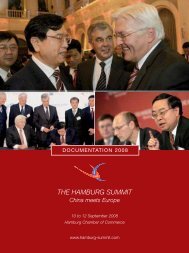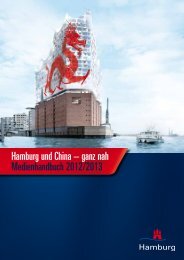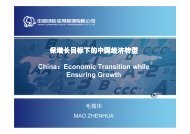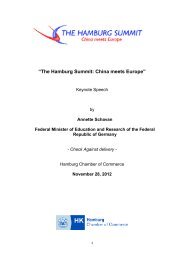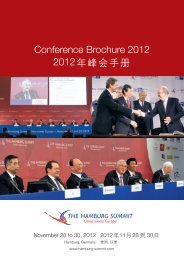Documentation Brochure - Hamburg Summit
Documentation Brochure - Hamburg Summit
Documentation Brochure - Hamburg Summit
- No tags were found...
Create successful ePaper yourself
Turn your PDF publications into a flip-book with our unique Google optimized e-Paper software.
Competing Powers in Asia<br />
The Australian Ambassador to Germany,<br />
Ian Kemish, tells an anecdote<br />
to describe relations among Asian<br />
countries. Some years ago he attended<br />
a conference of Asian states at which<br />
the former Japanese Prime Minister<br />
Junichiro Koizumi spoke. Koizumi<br />
addressed one head of government<br />
after another directly, describing bluntly<br />
the conflicts that Japan had with his<br />
country. Kemish feared that there might<br />
be an uproar. But Koizumi ended his<br />
speech by saying that Japan enjoyed<br />
very close economic ties with these<br />
countries and that he was therefore<br />
willing to resolve all of the conflicts.<br />
Ampalanavar Selverajah, the<br />
Singaporean Ambassador to Germany,<br />
also emphasised the peacekeeping<br />
effect of economic ties. “The more<br />
intense economic growth, the more<br />
everybody has to lose by a conflict,” he<br />
said. “But where are the problems”,<br />
Eberhard Sandschneider, Otto Wolff<br />
Director of the Research Institute at the<br />
German Council on Foreign Relations,<br />
asked. Volker Stanzel, German<br />
Ambassador to China, conceded that<br />
“competition in Asia sometimes gives<br />
rise to fears,” but Asian countries are<br />
discovering the advantages of cooperation.<br />
“Instead of competing powers in<br />
Asia we will have competing regions like<br />
the United States, the EU and Asia,”<br />
Stanzel predicted. “But we want an<br />
architecture that is open,” said Selverajah,<br />
“because Asia is still a region of<br />
difference.”<br />
China, Japan and India will have a<br />
stake in the region, but there is always<br />
“an invisible partner in the room,”<br />
Kemish pointed out: the United States,<br />
China and Japan were the leading<br />
powers and “no country in the region<br />
wants to be in a position where it has to<br />
choose between them,” Selverajah said.<br />
Relations between China and Japan<br />
are the most important for regional<br />
development and security. China’s rise<br />
has a greater impact on Japan than on<br />
the United States. In 20 years China will<br />
have overtaken Japan in economic<br />
power. “For a stable Asia it is important<br />
that both countries come together,”<br />
Selverajah is convinced. The conclusion<br />
reached by Guo Wei, President of<br />
Digital China Holdings, is wholly consistent<br />
with the positive underlying<br />
mood. “Chinese growth should bring<br />
benefits to the world, even to Japan,”<br />
he said. “The largest risk is misunderstanding.”<br />



